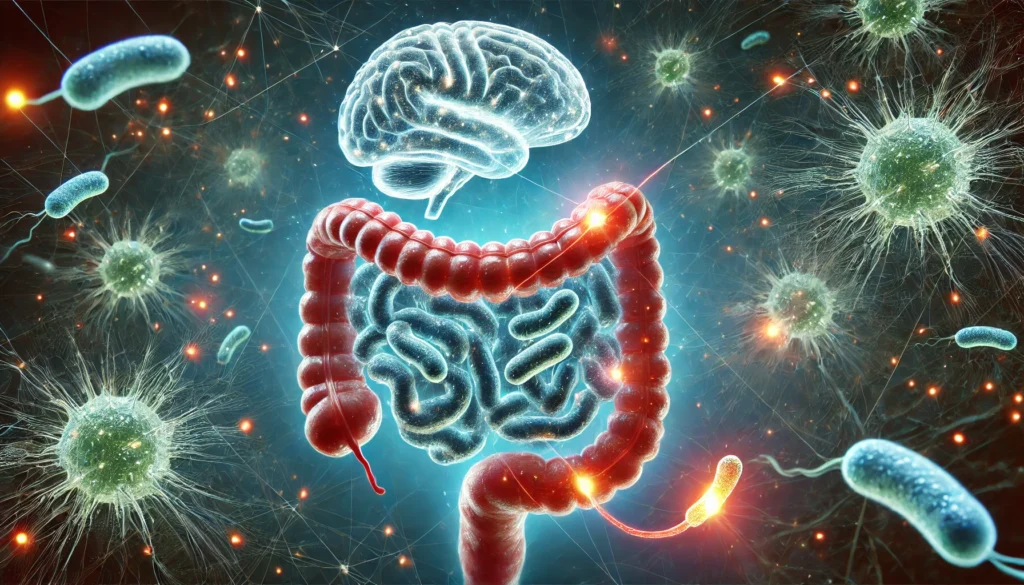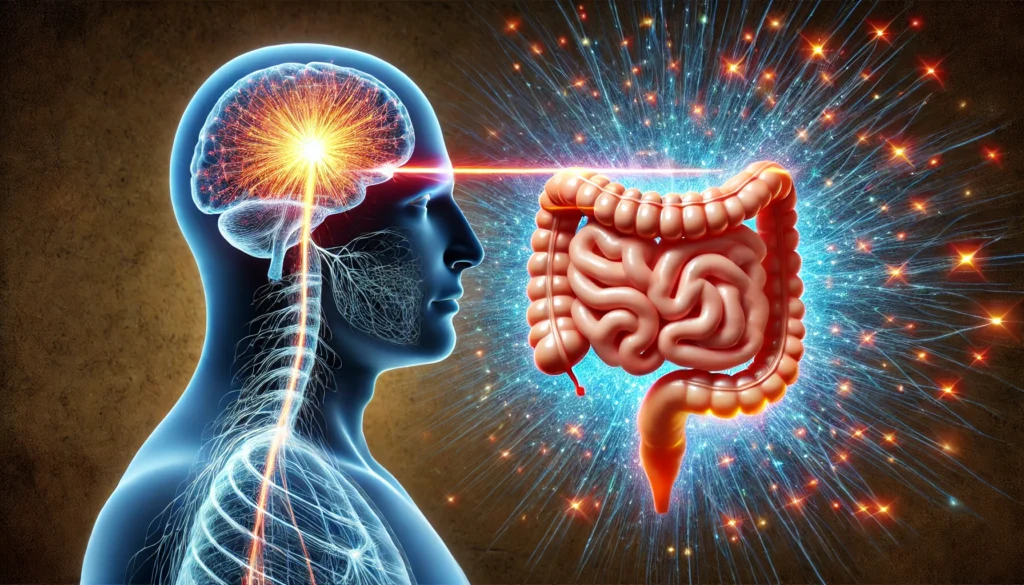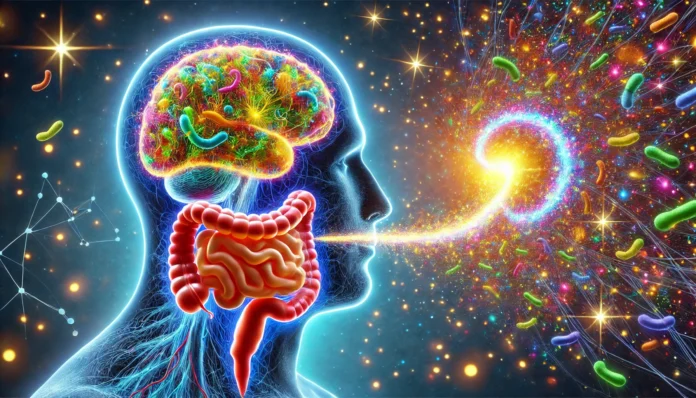The intricate relationship between the gut and the brain is a subject of growing scientific inquiry, particularly in the fields of neuroscience, psychology, and gastroenterology. The emerging understanding of how beneficial gut bacteria influence mental health and cognitive function is reshaping modern medicine’s approach to treating mood disorders, cognitive decline, and overall well-being. The human gut is home to trillions of microorganisms, many of which play a crucial role in digestion, immune function, and even brain health. These helpful bacteria, often referred to as probiotics or microbiota, have been shown to affect neurotransmitter production, inflammation, and neural pathways that link the gut and brain.
You may also like: How to Improve Gut Health Naturally: Science-Backed Tips for a Stronger Microbiome
The Gut-Brain Axis: An Overview
The gut-brain axis is a bidirectional communication system between the gastrointestinal tract and the central nervous system. This complex network involves the vagus nerve, the immune system, and various biochemical pathways, including neurotransmitters such as serotonin, dopamine, and gamma-aminobutyric acid (GABA). Beneficial gut bacteria are integral to this communication, influencing emotional regulation, stress response, and cognitive function. When the microbiome is balanced, it promotes mental resilience, but dysbiosis—a disruption in microbial diversity—has been linked to conditions such as anxiety, depression, and even neurodegenerative diseases.
The Role of Beneficial Gut Bacteria in Neurotransmitter Production
Neurotransmitters are chemical messengers that transmit signals between nerve cells. Many of these vital compounds are either produced or modulated by gut bacteria. For example, approximately 90% of serotonin, a neurotransmitter essential for mood regulation, is synthesized in the gut. The name of the good germs responsible for serotonin production includes Lactobacillus and Bifidobacterium species, which are known to improve emotional stability and reduce symptoms of depression. Similarly, Bacillus and Bifidobacterium strains contribute to GABA production, which plays a crucial role in reducing anxiety and promoting relaxation. Without a healthy population of these microbes, neurotransmitter imbalances can contribute to mental health disorders.
Gut Bacteria and Inflammation: The Key to Cognitive Health
Inflammation is a primary driver of many chronic diseases, including those affecting the brain. Beneficial gut bacteria help regulate immune responses by reducing systemic inflammation and promoting a balanced immune system. Chronic inflammation has been linked to cognitive decline, brain fog, and an increased risk of neurodegenerative conditions such as Alzheimer’s and Parkinson’s diseases. By maintaining a healthy balance of microbiota, individuals can mitigate inflammation, protecting brain cells from oxidative stress and damage. The good bacteria in humans be like natural anti-inflammatory agents, ensuring that the body and brain function optimally.

The Impact of Gut Microbiota on Stress and Anxiety
Stress and anxiety disorders are becoming increasingly prevalent in modern society, and research suggests that gut health may play a significant role in stress resilience. Beneficial gut bacteria influence the hypothalamic-pituitary-adrenal (HPA) axis, which regulates the body’s response to stress. Imbalances in the gut microbiome can lead to heightened cortisol levels, exacerbating symptoms of anxiety and depression. Certain probiotic strains, such as Lactobacillus rhamnosus and Bifidobacterium longum, have been shown to reduce stress-related behaviors and lower cortisol levels in both animal and human studies.
The Connection Between Gut Health and Cognitive Performance
Cognitive function encompasses memory, learning, attention, and problem-solving abilities, all of which can be influenced by gut bacteria. Research indicates that individuals with a diverse and balanced gut microbiome tend to have better cognitive performance compared to those with an imbalanced gut flora. Beneficial gut bacteria contribute to the production of short-chain fatty acids (SCFAs), such as butyrate, which support brain cell function, enhance neuroplasticity, and reduce cognitive decline associated with aging. The gut-brain connection underscores the importance of maintaining gut health for long-term cognitive well-being.
Strategies to Improve Gut Health for Mental and Cognitive Well-Being
Maintaining a thriving gut microbiome requires dietary and lifestyle interventions. Consuming fiber-rich foods, fermented products, and prebiotics can enhance the growth of beneficial bacteria. Regular exercise, stress management techniques, and avoiding excessive antibiotic use also contribute to gut health. Incorporating probiotics and dietary sources of helpful bacteria, such as yogurt, kefir, and fermented vegetables, can further support cognitive and mental health.

Frequently Asked Questions (FAQ): How Beneficial Gut Bacteria Support Mental Health & Cognitive Well-Being
1. How do beneficial gut bacteria influence brain function beyond neurotransmitter production?
Beneficial gut bacteria contribute to brain function through multiple pathways, not just neurotransmitter production. These microbes help regulate the permeability of the gut lining, preventing harmful substances from entering the bloodstream and reaching the brain. A compromised gut barrier can lead to systemic inflammation, which has been linked to cognitive decline and mental health disorders. Additionally, beneficial gut bacteria play a role in metabolizing dietary compounds into neuroprotective substances, such as polyphenols, which can enhance cognitive resilience. Furthermore, these bacteria help synthesize essential vitamins, including B vitamins and vitamin K, which are crucial for brain health and neuroprotection.
2. Can beneficial gut bacteria help prevent or slow down neurodegenerative diseases?
Emerging research suggests that beneficial gut bacteria may play a role in preventing or slowing the progression of neurodegenerative diseases such as Alzheimer’s and Parkinson’s. One mechanism involves reducing neuroinflammation, a key contributor to these conditions. Certain probiotic strains produce metabolites like butyrate, which have anti-inflammatory and neuroprotective properties. Additionally, maintaining a diverse gut microbiome supports mitochondrial function, which is critical for energy production in neurons. Since the gut microbiota influences amyloid plaque formation, which is implicated in Alzheimer’s disease, a healthy microbiome may reduce the risk of cognitive impairment over time.
3. How does stress impact the balance of beneficial gut bacteria?
Chronic stress negatively affects the gut microbiome by reducing the diversity of beneficial gut bacteria and increasing populations of harmful microbes. Stress activates the hypothalamic-pituitary-adrenal (HPA) axis, leading to elevated cortisol levels, which can alter gut motility and reduce the production of protective mucus in the intestines. This disruption allows opportunistic pathogens to thrive, further exacerbating gut inflammation. Additionally, stress-induced changes in gut bacteria composition can lead to imbalances in neurotransmitter production, making individuals more susceptible to anxiety and depression. Incorporating relaxation techniques and a gut-friendly diet can help counteract these effects and support microbial balance.
4. What role does diet play in maintaining beneficial gut bacteria for mental health?
Diet is a fundamental factor in maintaining a diverse and healthy gut microbiome, which directly impacts mental health. Consuming fiber-rich foods, such as fruits, vegetables, and whole grains, provides prebiotics that feed beneficial gut bacteria. Fermented foods like yogurt, kimchi, and sauerkraut contain probiotics that help maintain microbial diversity. Additionally, polyphenols found in berries, green tea, and dark chocolate support the growth of helpful bacteria while reducing inflammation. Avoiding processed foods, excessive sugar, and artificial additives is also essential, as these can disrupt microbial balance and contribute to mood instability. Hydration and adequate protein intake further support gut health by aiding digestion and microbial metabolism.
5. Are there specific strains of beneficial gut bacteria that are particularly effective for cognitive well-being?
Yes, certain probiotic strains have been identified for their cognitive and mood-enhancing effects. Lactobacillus rhamnosus has been shown to reduce anxiety-like behavior by modulating GABA receptors in the brain. Bifidobacterium longum supports stress resilience and helps regulate cortisol levels. Lactobacillus plantarum plays a role in reducing inflammation and enhancing memory function. Additionally, Bacillus subtilis contributes to the production of dopamine and serotonin, essential neurotransmitters for mental health. Regular consumption of foods or supplements containing these strains may provide cognitive benefits and emotional stability.
6. How does gut bacteria diversity compare in individuals with mental health disorders?
Studies have found that individuals with mental health disorders often exhibit lower microbial diversity compared to those with optimal mental well-being. Conditions such as depression, anxiety, and schizophrenia have been linked to an imbalance of gut bacteria, known as dysbiosis. This imbalance is typically characterized by a reduction in beneficial bacteria and an overgrowth of pro-inflammatory microbes. Lower levels of Bifidobacterium and Lactobacillus species have been observed in individuals with depression, while an increase in inflammatory bacteria has been associated with heightened anxiety symptoms. Restoring microbial balance through diet and probiotics may help alleviate some of these symptoms and improve overall mental health.
7. Can antibiotic use negatively impact mental health through gut bacteria disruption?
Yes, excessive or prolonged antibiotic use can significantly disrupt gut bacteria, leading to potential mental health consequences. Antibiotics do not differentiate between harmful and beneficial gut bacteria, often eliminating entire populations of helpful microbes. This disruption can lead to increased gut permeability, also known as leaky gut, which has been associated with systemic inflammation and mood disturbances. Additionally, the loss of beneficial gut bacteria affects neurotransmitter production, potentially leading to anxiety, depression, and cognitive dysfunction. To mitigate these effects, individuals should consider taking probiotics during and after antibiotic treatment to help restore microbial balance.
8. How does exercise influence beneficial gut bacteria and cognitive function?
Regular physical activity has been shown to positively influence gut bacteria composition, which in turn benefits cognitive function. Exercise increases the abundance of beneficial gut bacteria, particularly those involved in producing short-chain fatty acids that support brain health. Aerobic exercise, in particular, has been linked to increased microbial diversity and enhanced gut barrier integrity. Additionally, exercise helps regulate stress hormones, reducing the negative impact of chronic stress on the microbiome. Engaging in activities such as walking, yoga, or resistance training can contribute to both gut health and cognitive resilience, reinforcing the gut-brain connection.
9. Can sleep quality affect the balance of beneficial gut bacteria?
Yes, sleep quality has a profound impact on gut bacteria and overall mental well-being. Poor sleep disrupts the circadian rhythm, which can alter the composition of the gut microbiome. Sleep deprivation has been linked to reduced microbial diversity and an increase in pro-inflammatory bacteria, which can negatively impact mood and cognitive performance. Additionally, gut bacteria regulate the production of melatonin, the hormone responsible for sleep-wake cycles, creating a bidirectional relationship between sleep and microbiome health. Prioritizing good sleep hygiene, such as maintaining a consistent bedtime, reducing blue light exposure, and avoiding heavy meals before sleep, can help support a healthy gut and mental clarity.
10. What are the long-term implications of maintaining a balanced gut microbiome for cognitive aging?
Maintaining a balanced gut microbiome has significant long-term benefits for cognitive aging and neurological health. A diverse and stable microbiome helps reduce neuroinflammation, a key factor in age-related cognitive decline. Beneficial gut bacteria produce compounds that protect brain cells from oxidative stress, slowing down the progression of diseases such as dementia and Alzheimer’s. Additionally, a well-balanced gut microbiome supports vascular health, ensuring adequate blood flow to the brain, which is crucial for memory and learning. By adopting a gut-friendly lifestyle early in life, individuals can potentially enhance their cognitive resilience and reduce the risk of neurodegenerative conditions as they age.

Conclusion: A Holistic Approach to Mental and Cognitive Health
The emerging science on the gut-brain connection highlights the profound impact of beneficial gut bacteria on mental and cognitive well-being. Understanding how the microbiome affects neurotransmitter production, inflammation, stress response, and cognitive function allows for targeted interventions to improve overall health. By prioritizing gut health through diet, lifestyle, and probiotics, individuals can harness the power of these microscopic allies to enhance their mental clarity, emotional resilience, and cognitive longevity. The future of mental health treatment may well rest in the delicate balance of the gut microbiome, underscoring the importance of nurturing these essential microbes for a healthier mind and body.
gut-brain connection, microbiome and mental health, probiotics for brain health, gut flora and mood, digestive health and cognition, gut bacteria and stress, brain-gut axis, neurotransmitters and gut health, mental resilience and gut microbiota, healthy gut for mental clarity, microbiome balance and anxiety, fermented foods for brain health, gut health and emotional well-being, prebiotics for cognitive function, diet and mental health, gut microbiome and sleep, inflammation and brain function, holistic mental wellness, neuroprotection through gut health, cognitive aging and gut bacteria
Further Reading:
The Role of Gut Microbiota in Anxiety, Depression, and Other Mental Disorders
Feed your microbes to deal with stress
Gut microbiome and brain health
Disclaimer
The information contained in this article is provided for general informational purposes only and is not intended to serve as medical, legal, or professional advice. While Health11News strives to present accurate, up-to-date, and reliable content, no warranty or guarantee, expressed or implied, is made regarding the completeness, accuracy, or adequacy of the information provided. Readers are strongly advised to seek the guidance of a qualified healthcare provider or other relevant professionals before acting on any information contained in this article. Health11News, its authors, editors, and contributors expressly disclaim any liability for any damages, losses, or consequences arising directly or indirectly from the use, interpretation, or reliance on any information presented herein. The views and opinions expressed in this article are those of the author(s) and do not necessarily reflect the official policies or positions of Health11News.


